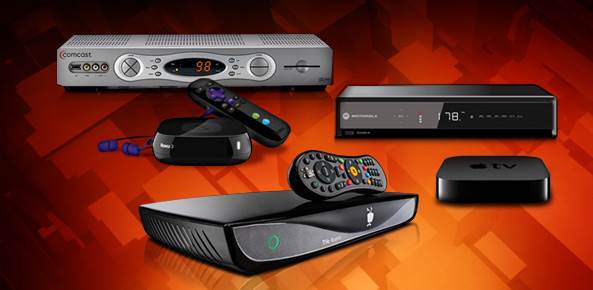
Your streaming TV options have gotten better and cheaper. Features that once required a $100 device can now be had for as little as $30. A cheap device is fine for getting TV shows and movies from most popular services onto a big-screen TV — as long as it’s a regular, high-definition set. Of course, it’s possible to simply watch video on a phone or tablet, but it’s not as satisfying from a living-room couch.
Here’s a holiday buying guide for the TV-streamers in your life.
Streaming Built-In
Smart TVs, game consoles and the TiVo digital video recorder all have streaming apps, and if all you watch is Netflix and Hulu, you’ll be fine with those. But apps for individual channels such as The CW and FX won’t work with every device.
The exceptions are TVs running Roku software or that have Google’s Chromecast technology built in; they tend to have wider app selections.
Getting Around
Devices vary in how easy it is to access apps and video. While many devices are getting voice features that let you search multiple services at once, you’ll still need to navigate on-screen menus with a remote.
The exception is Chromecast, which has no menu or remote at all. Instead, you start video on an iPhone or Android phone and send it to the big screen with a tap of a cast button. With some video services, the phone is freed up for other things, though you’ll need to use the phone as a remote for pausing and rewinding.
Devices running Google’s Android TV come with Chromecast features and pack their menus with video from Google’s YouTube service. Amazon’s Fire TV device has traditionally favored Amazon video over others, though that’s changing as Netflix, HBO and other leading services get prominence on the home screen. Roku is the most service-agnostic of the bunch. Apple TV ships with Apple services, but it’s easy to replace those with your favorites.
App Selection
Roku has one of the most complete app libraries, though Apple’s iTunes service is notably missing. You’ll need an Apple TV to access iTunes.
Apple TV also has a good app selection, though out of 25 leading services The Associated Press checked, it’s missing direct access to Amazon, Google Play, Vudu and PlayStation Vue. You can get the first three indirectly with a Chromecast-like feature called AirPlay if you have a companion iPhone or other Apple device.
Amazon’s Fire TV device is missing iTunes, Google Play, Vudu, ABC, Freeform and the NFL (though some games are shown through Twitter’s app).
The selection on Android TV is also limited, but you can supplement that with apps for Chromecast. With an Android phone, you can get all but iTunes, though getting Amazon video is tough, as it requires getting Amazon’s “Underground” app store first. With an iPhone, you’re missing iTunes, Amazon and USA Network, even with AirPlay. If you just have a Chromecast device with an iPhone, you’re also missing Freeform (formerly ABC Family) and CNN.
You’ll still need individual subscriptions to these services. The streaming device merely enables playback on the big screen.
Entry-Level Devices
Amazon’s Fire TV Stick stands out as a speedy, capable device for $40. It now comes with a voice remote for searches and Alexa assistant queries on weather, sports scores and other information.
The Roku Express is cheaper at $30, though there’s no voice remote, and the interface is slower (which doesn’t matter as much once you sit back and watch the video). It’s a great choice considering its wider app selection, notwithstanding the lack of iTunes.
Google’s entry-level Chromecast costs $35 — affordable, though the gadget is clunky without its own remote. It’s slightly better with Android than iPhones.
Mid-Range Devices
Xiaomi’s Mi Box is a speedy Android TV device with a nice price tag, $69. It supports higher-resolution video known as 4K, an option that once required more expensive devices. But you need a 4K TV and services that offer 4K video — so far, Netflix and YouTube do so for just some of their offerings. Mi Box also supports HDR picture quality. HDR, or high dynamic range, promises brighter whites, darker blacks and a richer range of colors — but you need an HDR TV and HDR video.
Google’s new Chromecast Ultra also has 4K and HDR support for $69. Because Mi Box also does Chromecast, you get more overall for the same price. Mi Box also has a voice remote.
The Roku Premiere also offers 4K for $80, but its remote lacks voice support. Amazon’s regular Fire TV has 4K and a voice remote for $90. Neither has HDR. For now, HDR sets are rarer than 4K, and even 4K sets aren’t that common.
Why Pay More?
The $100 Roku Premiere Plus and the $130 Roku Ultra offer both 4K and HDR. The remote for both also has a headphone jack for listening when everyone else is asleep. The Ultra also has a voice remote, something many cheaper devices offer. That remote also has gaming buttons and emits a sound when you lose it in a couch.
For hard-core gamers, consider the $200 Nvidia Shield TV, an Android TV with both 4K and HDR support, plus faster processors for games with intensive graphics.
Another premium choice is Apple TV, which starts at $149. You don’t get 4K or HDR, which won’t matter for regular sets. Instead, you get plenty of apps that do more than play video. You can browse Ikea’s catalog, order food from Grubhub and get the AccuWeather forecasts. For video, an upcoming app simply called TV promises to bring together all your viewing from various channels and services. An iPhone isn’t required, but helps. Sorry, no Android.
And for iTunes, Apple TV is the only choice.
© -. -.


![[Video] Samsung Outlines AI Vision at The First Look 2026](https://loginby.com/itnews/wp-content/uploads/2026/01/Video-Samsung-Outlines-AI-Vision-at-The-First-Look-2026-238x178.jpg)
![[Video] An Exclusive Look at Galaxy XR With the Engineers](https://loginby.com/itnews/wp-content/uploads/2025/10/Video-An-Exclusive-Look-at-Galaxy-XR-With-the-Engineers-238x178.jpg)



